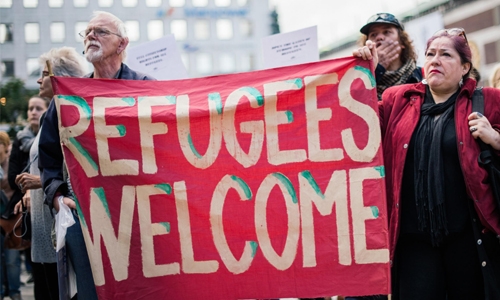Sweden, a blessed land for migrants
I was nursing my daughter in our home here when I learned that the nationalist Sweden Democrats captured 17.5 per cent of the vote in parliamentary elections last month. Since neither the traditional left or right blocs won a majority, the Sweden Democrats, with roots in the neo-Nazi movement, hold the balance of power. In the days leading up to the election I received racist propaganda in my mailbox from a more extreme right party that said of immigrants, “Time to go home.”
It made me reflect on the women in my family and our own history of migration. In the early 1900s, Sweden was a country you migrated from, not to. My great-grandmother on my father’s side, Agnes Ester, was among the million Swedes who set sail for the United States in that era. She left the family farm for Ellis Island to meet up with her older brothers. But she didn’t stay for long. Her lungs couldn’t take New York’s heat waves and she longed to marry a redheaded boy she had met back home.
Nearly 50 years later, my maternal grandmother, Isabella, was 18 years old and preparing to leave her hometown in Sardinia with her two young children. They were to join my grandfather, who was working in the coal mines in Alsace-Lorraine in northeastern France. It was a dangerous job, but better than the alternative many Sardinians were facing. After World War II, Isabella and her family were so poor that some days, while nursing her youngest child, she had only bread and fried onions to eat. She boarded a ferry with my 2-year-old mother and her baby brother and crossed the Mediterranean Sea in hope of a better future — just as many people are doing at this very moment, but under much more dire circumstances. The family later resettled in Paris, where she eventually opened a restaurant. Bit by bit, they built a better life for themselves.
My mother is an immigrant, too. One hot summer night in 1974, the 19-year-old Maura Isabelle met my Swedish father, who was traveling by Interrail through Europe, at a Parisian cafe. Within a year they married in Paris, but decided their home base would be Goteborg, Sweden. When my mother first came here, an official at the government job agency told her it wouldn’t matter what education she had, as a foreigner she would only ever clean houses. Undeterred, she soon became fluent in Swedish and got a job on her own. She still works as a librarian.
But no matter how well-integrated you are, in homogeneous Sweden you could be labeled an immigrant your whole life. A customer at the library once yelled “go home” at my mother, who has dark hair and brown eyes. If this happened to her, I shudder to think what people from more marginalized minority groups experience. The Sweden Democrats want to “offer” foreign-born residents help to return to their country of origin, to “go home.” Their party leader claimed in a televised debate that some immigrants are failing to find jobs because “they are not Swedes — they don’t fit in.” Sweden has historically had a generous policy for refugees seeking asylum and their families.
During the European migrant crisis, Sweden was among the countries that accepted the biggest share of refugees fleeing war and terrorism in Syria, Afghanistan and Iraq. Buckling under the strain to process asylum applications, house and integrate these newcomers, Parliament passed a temporary law that limits the number of people granted permanent residency and restricts immigration by relatives of refugees settled here. What will happen next year when the temporary law expires will be up to the new government. As I write this, Ulf Kristersson, who leads the Moderate Party and the centerright alliance, has been given the task of forming a new government. He might now turn to the Sweden Democrats for support.
In a small country of 10 million people, the cost of immigration is often debated. But already, nearly one-fifth of the population is foreign-born. Lost in a conversation where people are reduced to numbers is how much immigrants potentially contribute in tax revenue over time. And with an aging population, there will be a shortage of workers in many different fields. How can we tackle that demand, if not by welcoming immigrants and letting them stay?
My mother became a Swedish citizen in the mid-1980s after my brother and I were born, during the twilight of the Cold War, when the Berlin Wall was still intact. She felt it could be risky to have a different citizenship from her children. I hope we never have to find out if that was a legitimate concern. As I think about my daughters, Agnes and baby Ester, I hope that they will be able to follow in the tradition of the women in our family, and have the right to travel freely across borders. That they can fall in love with whomever they want, and that person would feel welcome in Swedish society. That we are still a liberal democracy that stands up for the right to asylum, in a unified Europe. That we reject these illusory ideas about irreconcilable differences between cultures and put the dignity and equal worth of all people as the highest value.
Related Posts

